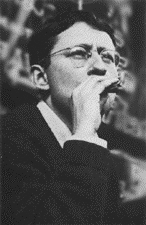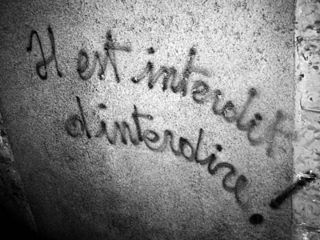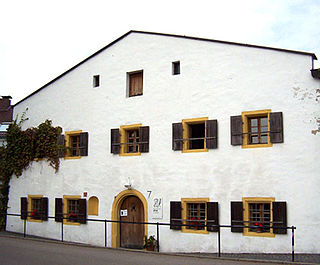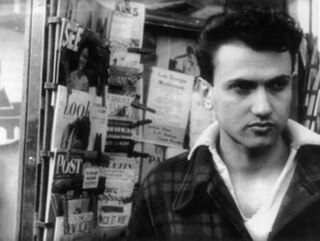Related Research Articles

The Situationist International (SI) was an international organization of social revolutionaries made up of avant-garde artists, intellectuals, and political theorists. It was prominent in Europe from its formation in 1957 to its dissolution in 1972. The intellectual foundations of the Situationist International were derived primarily from libertarian Marxism and the avant-garde art movements of the early 20th century, particularly Dada and Surrealism. Overall, situationist theory represented an attempt to synthesize this diverse field of theoretical disciplines into a modern and comprehensive critique of mid-20th century advanced capitalism.

Guy-Ernest Debord was a French Marxist theorist, philosopher, filmmaker, critic of work, member of the Letterist International, founder of a Letterist faction, and founding member of the Situationist International. He was also briefly a member of Socialisme ou Barbarie.

The Letterist International (LI) was a Paris-based collective of radical artists and cultural theorists between 1952 and 1957. It was created by Guy Debord and Gil J. Wolman rejoined by Jean-Louis Brau and Serge Berna as a schism from Isidore Isou's Lettrist group. The group went on to join others in forming the Situationist International, taking some key techniques and ideas with it.

Psychogeography is the exploration of urban environments that emphasizes interpersonal connections to places and arbitrary routes. It was developed by members of the Letterist International and Situationist International, which were revolutionary groups influenced by Marxist and anarchist theory as well as the attitudes and methods of Dadaists and Surrealists. In 1955, Guy Debord defined psychogeography as "the study of the precise laws and specific effects of the geographical environment, consciously organized or not, on the emotions and behavior of individuals." One of the key tactics for exploring psychogeography is the loosely defined urban walking practice known as the dérive. As a practice and theory, psychogeography has influenced a broad set of cultural actors, including artists, activists and academics.

Asger Oluf Jorn was a Danish painter, sculptor, ceramic artist, and author. He was a founding member of the avant-garde movement COBRA and the Situationist International. He was born in Vejrum, in the northwest corner of Jutland, Denmark, and baptized Asger Oluf Jørgensen.

Charles Radcliffe was an English cultural critic, political activist and theorist known for his association with the Situationist movement.
Jørgen Nash was a Danish artist, writer and central proponent of Situationism.
Raoul Vaneigem is a Belgian writer known for his 1967 book The Revolution of Everyday Life.

Gruppe SPUR was an artistic collaboration formed by the German painters Heimrad Prem, Helmut Sturm, and Hans-Peter Zimmer, and the sculptor Lothar Fischer in 1957. They published a journal of the same name Spur.

Isidore Isou, born Isidor Goldstein, was a Romanian-born French poet, dramaturge, novelist, film director, economist, and visual artist. He was the founder of Lettrism, an art and literary movement which owed inspiration to Dada and Surrealism.

Unitary urbanism (UU) was the critique of status quo "urbanism", employed by the Letterist International and then further developed by the Situationist International between 1953 and 1960.

Chlef is the capital of Chlef Province, Algeria. Located in the north of Algeria, 200 kilometres (120 mi) west of the capital, Algiers, it was founded in 1843, as Orléansville, on the ruins of Roman Castellum Tingitanum. In 1962, it was renamed al-Asnam, but after the devastating earthquake on October 10, 1980, it has borne its present name, Chlef, which is derived from the name of the Chelif River, the longest river in Algeria.

The Ultra-Lettrist art movement was developed by Jean-Louis Brau, Gil J. Wolman, and François Dufrêne in the 1950s when they split from Isidore Isou's Lettrism movement.

Michèle Bernstein is a French novelist and critic, most often remembered as a member of the Situationist International from its foundation in 1957 until 1967, and as the first wife of its most prominent member, Guy Debord.
The Workshop for Non-Linear Architecture (WNLA) was a group of experimental artists and psychogeographers. The group was active in parts of Great Britain and Glasgow during the 1990s. Based on the urban practices of the Paris-based Lettriste Internationale (1952–1957), the workshop focused on developing the Lettrist theory of Unitary Urbanism. The theory was developed through physical research and behavioral intervention.

Ken Knabb is an American writer, translator, and radical theorist, known for his translations of Guy Debord and the Situationist International. His own English-language writings, many of which were anthologized in Public Secrets (1997), have been translated into over a dozen additional languages. He is also a respected authority on the political significance of Kenneth Rexroth.

Mémoires (Memories) is an artist's book made by the French social critic Guy Debord in collaboration with the Danish artist Asger Jorn. Its last page mentions that it was printed in 1959, however, it was printed in December 1958. This publication is the second of two collaborative books by Jorn and Debord whilst they were both members of the Situationist International.
Hassi Dahou is a town and commune in Sidi Bel Abbès Province in northwestern Algeria.
Sidi Dahou el Zairs is a town and commune in Sidi Bel Abbès Province in north-western Algeria.

Socialisme ou Barbarie was a French-based radical libertarian socialist group of the post-World War II period whose name comes from a phrase which was misattributed to Friedrich Engels by Rosa Luxemburg in the Junius Pamphlet, but which probably was most likely first used by Karl Kautsky. It existed from 1948 until 1967. The animating personality was Cornelius Castoriadis, also known as Pierre Chaulieu or Paul Cardan. Socialisme ou Barbarie is also the name of the group's journal.
References
- ↑ Porter, David (2011). Eyes to the South: French Anarchists and Algeria. AK Press. ISBN 9781849350761 . Retrieved 8 May 2018.
- ↑ Cooper, Sam (2016). The Situationist International in Britain: Modernism, Surrealism, and the Avant-Garde. Routledge. ISBN 9781317190790 . Retrieved 10 May 2018.